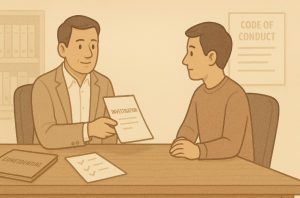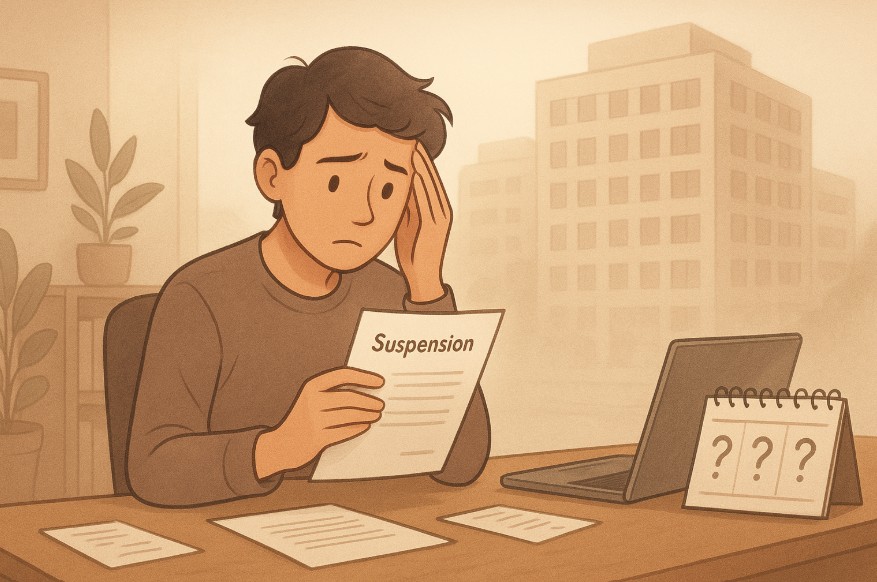Being suspended from work pending an investigation can be a distressing and confusing experience. You might be left wondering what your rights are, how long it will last, and whether your job is at risk.
It’s important to understand that suspension is typically a precautionary measure rather than a disciplinary outcome. While it may feel isolating, the law offers you specific rights to ensure you’re treated fairly throughout the process.
From maintaining pay and privacy to participating in the investigation and receiving timely updates, you are entitled to a level of transparency and support. This guide outlines everything you need to know to protect yourself during this difficult time.
What Does Being Suspended from Work Mean?

Suspension from work means that your employer has temporarily removed you from your duties while an investigation is carried out.
This is usually done to ensure a fair and impartial inquiry into allegations or potential misconduct. Importantly, suspension is not a declaration of guilt.
In most cases, the suspension will be on full pay, and your contractual rights remain in effect unless otherwise specified in your employment contract.
It is often used to prevent interference with the investigation, protect colleagues, clients or business interests, and maintain workplace harmony during sensitive situations. You may be asked not to contact colleagues or access company systems while suspended.
However, employers are expected to make this clear from the outset and provide written confirmation outlining the reason for the suspension. Understanding this process can help you remain composed and take the right steps as your case progresses.
Why Might an Employer Suspend You from Work?
There are several reasons why an employer may choose to suspend an employee. Suspension typically occurs when an allegation is made that requires a thorough investigation.
Common reasons include:
- Alleged gross misconduct, such as theft, fraud, or violence in the workplace
- Breach of health and safety policies or legal compliance
- Complaints from colleagues or customers involving harassment or discrimination
- Misuse of company systems or property
- A serious grievance or conflict that requires separation during the review
Suspension allows the employer to carry out an unbiased investigation without risk of interference or influence from the suspended employee.
It may also be used to protect others, the business’s reputation, or to ensure that the investigation proceeds in a calm and safe environment. It’s essential to note that suspension should never be used as a disciplinary measure on its own.
Rather, it’s a neutral step, used only when absolutely necessary, and it should be regularly reviewed by the employer to ensure it remains justified. Employers are also encouraged to explore alternatives before resorting to suspension.
Is Suspension a Disciplinary Action or a Neutral Act?

Suspension should be regarded as a neutral act, not a disciplinary punishment. The purpose is to create space for an investigation into allegations or incidents without suggesting guilt.
Under ACAS guidance, an employee should not be treated as though they have already done something wrong simply because they are suspended.
Employers are advised to ensure that suspensions are handled sensitively and proportionately. This includes informing the employee clearly in writing that the decision to suspend does not imply misconduct has been proven.
The suspension should be used as a last resort and reviewed regularly to confirm whether it is still necessary. It is also essential that the duration of the suspension be as short as possible.
Employers must maintain a fair and transparent approach, keeping communication open with the employee and ensuring the suspension doesn’t lead to stigma or damage to their professional reputation. This neutrality is key to upholding trust and fairness throughout the disciplinary process.
How Long Can You Be Suspended from Work Legally?
There is no specific legal time limit for how long an employee can be suspended from work in the UK. However, the duration must be “reasonable” and proportionate to the complexity of the investigation.
An indefinite or prolonged suspension without proper updates can be considered unfair and potentially lead to legal challenges.
ACAS guidelines recommend that employers keep suspension periods as short as possible and conduct regular reviews to assess whether continued suspension is necessary. The frequency of these reviews should also be made clear to the suspended employee.
During this time, you have the right to be informed of the progress of the investigation and should receive timely updates regarding its status.
If you’re left suspended for an excessive period with no communication, it’s important to raise concerns through internal grievance procedures or seek legal advice. The employer must balance investigation integrity with the employee’s right to fair treatment.
What Is the Employer’s Responsibility During Your Suspension?

Employers carry several key responsibilities during your suspension period. Their actions must align with both employment law and best practice guidance.
responsibilities of Employer’s
- Clear communication: You should receive written notice stating the reasons for suspension and outlining the next steps.
- Pay and benefits: Unless specified in your employment contract, your employer should continue to pay your full salary and provide benefits.
- Confidentiality: The employer must treat the situation discreetly, ensuring the suspension does not damage your reputation.
- Regular reviews: The employer should regularly assess whether the suspension is still necessary and update you on the investigation’s progress.
- Wellbeing support: Employers are encouraged to provide access to mental health and HR support during your time away from work.
- Fair process: You must be given the chance to respond to the allegations and provide evidence.
Employers should also take reasonable steps to prevent social isolation and psychological stress during this period.
Failure to fulfil these duties may be viewed as a breach of trust or an unfair employment practice, opening the door to grievances or legal actions. Employees are entitled to fair and respectful treatment throughout the process.
Suspended From Work Pending Investigation – What Are My Rights?
Being suspended does not mean your rights are taken away. As an employee, you retain several protections under UK employment law. Here are the key rights during suspension include:
Right to Be Informed
You have the right to be clearly informed in writing about your suspension, including the specific allegations being investigated.
This ensures transparency and allows you to understand the context and prepare your response accordingly. Vague or unclear reasons are not acceptable.
Right to Full Pay and Benefits
Unless your employment contract explicitly states otherwise, you should continue receiving your full salary and all contractual benefits during the suspension.
This reflects the neutral nature of suspension and prevents financial disadvantage while the investigation is ongoing.
Right to Participate in the Investigation
You must be given the opportunity to explain your side of the story, present evidence, and respond to the allegations made. This is vital for ensuring a fair investigation and upholding your right to defend yourself against any claims.
Right to Privacy and Confidentiality
Your suspension and the investigation should be handled discreetly, with only relevant parties informed. Gossip, unnecessary disclosure, or public shaming is not permitted, as it can damage your reputation and breach your right to confidentiality under employment law.
Right to Appeal Decisions
If you feel the suspension or any disciplinary decision resulting from it is unjust, you are entitled to appeal. This should be done through formal grievance procedures, and your employer is obligated to consider and respond to your appeal fairly.
It is important that employers follow fair procedures, in line with ACAS guidance, ensuring transparency and impartiality. If your rights are not upheld, you may seek recourse through internal policies or an employment tribunal.
Can You Be Dismissed After a Suspension?

Yes, you can be dismissed after a suspension, but only if the investigation confirms serious misconduct or other valid reasons.
The employer must carry out a full and fair disciplinary process before making any decisions. Suspension itself is not an indication of guilt and should not be seen as a disciplinary sanction.
If the investigation leads to a disciplinary hearing, you have the right to be accompanied and to present your case.
You should also receive all relevant evidence ahead of the meeting. Depending on the outcome, your employer may choose to reinstate you, issue a warning, or proceed with dismissal.
If you are dismissed, you have the right to appeal the decision. Any unfair dismissal could be challenged through an employment tribunal, especially if due process wasn’t followed.
Legal advice is advisable if you’re facing dismissal after suspension, particularly in cases involving complex allegations or unclear procedures.
What Should You Do If You Feel the Suspension Is Unfair?
If you believe your suspension is unfair, it’s important to act swiftly and through the appropriate channels to protect your rights.
Steps to Take
- Review the suspension letter: Understand the reasons provided and the allegations involved.
- Consult internal policies: Look at your company’s disciplinary procedures for clarity on suspension and investigation processes.
- Raise your concerns with HR: Request a review of the suspension decision and ask for regular updates on the case.
- Submit a formal grievance: If internal discussions don’t resolve the issue, file a grievance following your employer’s procedures.
- Seek support from a trade union: They can advocate for your rights, attend meetings, and help raise formal concerns.
- Get legal advice: Especially important if the suspension continues without updates or appears to be biased or retaliatory.
Suspension must be reasonable, justified, and proportionate. If you feel isolated or if the suspension is having a detrimental impact on your wellbeing or career, speak up. You have the right to be treated fairly, and there are legal avenues to challenge unfair practices.
Does Suspension Show on Your Employment Record?

In most cases, suspension will not form part of your formal employment record unless it results in disciplinary action.
If no further action is taken following the investigation, the suspension is considered a temporary measure and is generally not disclosed to future employers.
However, internal HR files may retain notes or documentation relating to the suspension for audit or procedural reasons.
Whether or not it appears in a reference depends on the employer’s policy and the nature of the suspension. If the suspension led to dismissal or disciplinary action, this may be reflected in your employment reference or record.
You have the right to request access to your employment record under data protection laws. If you’re concerned about the impact of a suspension on your future career, it’s worth discussing with HR how your case will be documented and whether any statement can be included to clarify the outcome.
Conclusion
Facing suspension from work pending investigation can be unsettling, but knowing your rights can help you navigate the process with greater confidence. Your employer is expected to treat you fairly, maintain confidentiality, and provide ongoing updates.
Remember, suspension is a neutral act and not a disciplinary judgment. You remain entitled to your pay, privacy, and participation in the investigation.
If you believe your rights have been violated, there are procedures in place for you to raise concerns or appeal decisions.
By staying informed and proactive, you can ensure your voice is heard and that your employment status is handled with due process and fairness.
FAQs
What happens after a workplace investigation is completed?
After the investigation, your employer will either reinstate you, proceed to a disciplinary hearing, or close the case with no further action.
Can I apply for another job while suspended?
You may apply for other jobs, but check your employment contract as you may remain bound by exclusivity terms during suspension.
Is suspension considered a punishment?
No, suspension is a neutral action used to protect the investigation’s integrity and should not be viewed as a penalty.
Are you entitled to mental health support during suspension?
Yes, employers have a duty of care and should provide access to mental health or HR support during your suspension.
Do I need a solicitor for a workplace suspension issue?
While not mandatory, legal advice can be helpful if you believe your suspension is unfair or disciplinary procedures are being mishandled.
Can you claim benefits if you’re suspended without pay?
You may be eligible to claim Universal Credit or other support if your suspension is unpaid, depending on your financial circumstances.
How does suspension affect probationary employees?
Probationary employees are more vulnerable, and suspension may lead to early termination, but fairness and legal procedures still apply.








